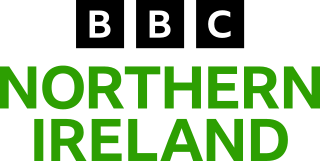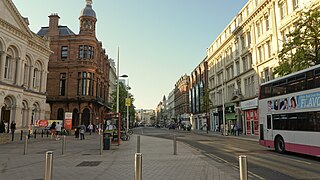
BBC Northern Ireland is a division of the BBC and the main public broadcaster in Northern Ireland. It is widely available across both Northern Ireland and the Republic of Ireland.
Local government in Northern Ireland is divided among 11 districts. Councils in Northern Ireland do not carry out the same range of functions as those in the rest of the United Kingdom; for example they have no responsibility for education, road-building or housing. Their functions include planning, waste and recycling services, leisure and community services, building control and local economic and cultural development. The collection of rates is handled centrally by the Land and Property Services agency of the Northern Ireland Executive.

The Mourne Mountains, also called the Mournes or Mountains of Mourne, are a granite mountain range in County Down in the south-east of Northern Ireland. They include the highest mountains in Northern Ireland, the highest of which is Slieve Donard at 850 m (2,790 ft). The Mournes are designated an Area of Outstanding Natural Beauty and it has been proposed to make the area Northern Ireland's first national park. The area is partly owned by the National Trust and sees many visitors every year. The Mourne Wall crosses fifteen of the summits and was built to enclose the catchment basin of the Silent Valley and Ben Crom reservoirs.

Kathleen Ni Houlihan is a mythical symbol and emblem of Irish nationalism found in literature and art, sometimes representing Ireland as a personified woman. The figure of Kathleen Ni Houlihan has also been invoked in nationalist Irish politics. Kathleen Ni Houlihan is sometimes spelled as Cathleen Ni Houlihan, and the figure is also sometimes referred to as the Sean-Bhean Bhocht, the Poor Old Woman, and similar appellations. Kathleen Ni Houlihan is generally depicted as an old woman who needs the help of young Irish men willing to fight and die to free Ireland from colonial rule, usually resulting in the young men becoming martyrs for this cause, the colonial power being the United Kingdom. After the Anglo-Irish War, Kathleen Ni Houlihan became associated with the Irish Republican Army in Northern Ireland, especially during the Troubles.

The economy of Northern Ireland is the smallest of the four constituents of the United Kingdom and the smaller of the two jurisdictions on the island of Ireland. At the time of the Partition of Ireland in 1922, and for a period afterwards, Northern Ireland had a predominantly industrial economy, most notably in shipbuilding, rope manufacture and textiles, but most heavy industry has since been replaced by services. Northern Ireland's economy has strong links to the economies of the Republic of Ireland and Great Britain.
Béḃinn or Bé Binn, in modern orthography Béibhinn, is an early Irish personal and mythological name. In some sources Béḃinn is a goddess associated with birth and the sister of the river-goddess, Boann. Béḃinn is also described as being an underworld goddess in both Irish and Welsh mythology, inhabiting either the Irish underworld Mag Mell or the Welsh Annwn, although it is unknown which is the original source.

BBC Two Northern Ireland is the Northern Irish variation of BBC Two operated by BBC Northern Ireland. It is broadcast via digital terrestrial transmitters and from the SES Astra 2E satellite at the 28.2° East orbital position.

Tourism Northern Ireland, also known as Tourism NI, is a non-departmental public body of the Department for the Economy. Its primary objective is to promote Northern Ireland as a tourist destination to domestic tourists, from within Northern Ireland, and to visitors from the Republic of Ireland.

Nuala Ní Dhomhnaill is a leading Irish poet.

Carál Ní Chuilín, formerly known as Caroline Cullen, is an Irish Sinn Féin politician and former Provisional IRA member. She has been a member of the Northern Ireland Assembly for Belfast North since 2007 and served in the Northern Ireland Executive as Minister of Culture, Arts and Leisure until 2016. On 15 June 2020, she was appointed Minister for Communities on a temporary basis, due to the health of the previous minister, Deirdre Hargey.
Eiléan Ní Chuilleanáin is an Irish poet and academic. She was the Ireland Professor of Poetry (2016–19).
The NIFL Development League is an intermediate Association football league in Northern Ireland consisting of the reserve teams of the twelve NIFL Premiership clubs.

Liadh Ní Riada is an Irish Sinn Féin politician who formerly served as a Member of the European Parliament (MEP) for the South constituency from 2014 to 2019. She was the Sinn Féin candidate in the 2018 presidential election. As of July 2020, Ní Riada is an Irish language planning officer for the Gaeltacht in Muskerry, County Cork.

The 2022 Northern Ireland Assembly election was held on 5 May 2022. It elected 90 members to the Northern Ireland Assembly. It was the seventh assembly election since the establishment of the assembly in 1998. The election was held three months after the Northern Ireland Executive collapsed due to the resignation of the First Minister, Paul Givan (DUP), in protest against the Northern Ireland Protocol.

The COVID-19 pandemic reached Northern Ireland in February 2020. The Department of Health reports 3,445 deaths overall among people who had recently tested positive. The Northern Ireland Statistics and Research Agency reports 5,310 where the death certificate mentioned COVID as one possible cause. Northern Ireland has the lowest COVID death rate per population in the United Kingdom. The vast majority of deaths have been among those over the age of 60 and almost half were in care homes. According to figures, about 1 in 10 of over 5,300 who have passed have been under 65.
The following is a timeline of the COVID-19 pandemic in Northern Ireland during 2020. There are significant differences in the legislation and the reporting between the countries of the UK: England, Scotland, Northern Ireland, and Wales.
The following is a timeline of the COVID-19 pandemic in Northern Ireland during 2021. There are significant differences in the legislation and the reporting between the countries of the UK: England, Scotland, Northern Ireland, and Wales.

A Northern Ireland Assembly election has to be held to elect 90 members to the Northern Ireland Assembly if the parties fail to form an Executive, which they have yet to do so. After the Northern Ireland Assembly election on 5 May 2022, the DUP declined to agree on the appointment of Speaker to the Assembly, preventing the formation of an Executive. Chris Heaton-Harris, the Secretary of State for Northern Ireland, confirmed a legal obligation to call an election if no Executive was formed by a 27 October 2022 deadline. No Executive was formed by this deadline, but the deadline was extended by legislation in the Westminster Parliament. A deadline of 18 January 2024 is now proposed.
The following is a timeline of the COVID-19 pandemic in Northern Ireland during 2022. There are significant differences in the legislation and the reporting between the countries of the UK: England, Scotland, Northern Ireland, and Wales.












